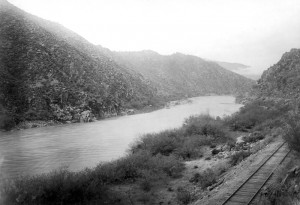In his book Border Oasis, Evan Ward tells the story of the transborder conflict between the United States and Mexico over salinity in the Colorado River. “Unfortunately,” Ward writes, “sometimes when one region solves its salinity problems, it creates new salinity problems for people downriver.” The conflict Ward describes began in 1961 when farmers on the U.S. side of the border began pumping water from their saline aquifer into the Gila River to create space to store fresh, clean imported Colorado River water. Needless to say, the Mexican farmers downstream, who began seeing their crops whither as a result, were none too pleased. Farmers on the U.S. side noted, correctly, that the treaty between the United States and Mexico merely specified the amount of Colorado River water we were required to deliver. The treaty, they noted, was silent on the question of whether it had to be actually usable water. A fascinating international conflict ensued that ultimately resulted in the signing of Minute 242 to the Treaty for the Utilization of Waters of the Colorado and Tijuana Rivers and of the Rio Grande, which guaranteed minimum salinity standards for the water we deliver to our Mexican neighbors.

Gila River, swollen by rain, from the mouth of Mineral Creek; Photo by J.B. Umpleby. Pinal County, Arizona. 1910. courtesy USGS
That’s a circuitous introduction to the point of this post, which is that the history suggests the Gila has always been a tad on the salty side. One of its main tributaries is named the “Salt River.” I’ve gotta think a river called “Salt” is up to no good.
The Gila, a desert river that rises in the mountains of southwestern New Mexico and drains a mostly desert watershed before dumping into the Colorado River just upstream from Yuma, has a longstanding reputation for icky:
What the Yumans called the stream was Hah-qua-sa-eel, with the accent on the final syllable. This can be translated as Running Water Which Is Salty.
The Spanish shortened it from the native Yuman pronunciation to Gila, pronounced “hee-la”, according to Edwin Corle’s Gila, River of the Southwest. I ran across this “running water which is salty” today in a number of references. Corle’s seems to be the earliest, and the others all seem to be quoting his words, though I’d love if anyone knows more about the origin of the name.
